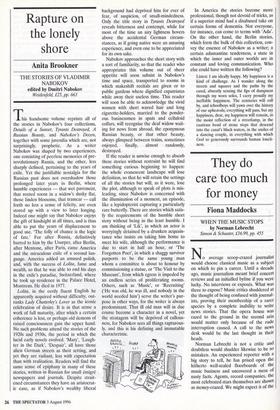Rapture on the lonely shore
Anita Brookner THE STORIES OF VLADIMIR NABOKOV edited by Dmitri Nabokov Weidenfeld, £25, pp. 663 This handsome volume reprints all of the stories in Nabokov's four collections, Details of a Sunset, Tyrants Destroyed, A Russian Beauty, and Nabokov's Dozen, together with some juvenilia which are, not surprisingly, prophetic. As a writer Nabokov was shaped by two experiences, one consisting of peerless memories of pre- revolutionary Russia, and the other, less sharply defined, pertaining to the years of exile. Yet the justifiable nostalgia for the Russian past does not overshadow those prolonged later years in Berlin, where humble experiences — that wet pavement, that rented room in a widow's dusky flat, those linden blossoms, that tramcar — call forth no less a sense of felicity, are even stored up with a view to later longing. Indeed one might say that Nabokov enjoys the gift of hindsight at all times, and is thus able to put the years of displacement to good use. 'The folly of chance is the logic of fate.' For after Russia, definitively barred to him by the Usurper, after Berlin, after Mentone, after Paris, came America and the miraculous exile of a second lan- guage. America added an amused polish, and, with the success of Lolita, fame and wealth, so that he was able to end his days in the exile's paradise, Switzerland, where he took up residence in the Palace Hotel, Montreux. He died in 1977.
Lolila, in the eerily fluent English he apparently acquired without difficulty, out- ranks Lady Chatterley's Lover as the iconic celebration of desire. It is in that sense a work of full maturity, after which a certain coherence is lost, or perhaps old demons of raised consciousness gain the upper hand. No such problems attend the stories of the 1920s and 1930s, the period in which the lucid early novels evolved. 'Mary', 'Laugh- ter in the Dark', 'Despair', all have those alien German streets as their setting, and yet they are radiant, less with expectation than with realisation. Readers will find the same sense of epiphany in many of these stories, written in Russian for small émigré newspapers and journals. Despite strait- ened circumstances they have an aristocrat- ic ease, as if Nabokov's wealthy liberal background had deprived him for ever of fear, of suspicion, of small-mindedness. Only the title story in Tyrants Destroyed reveals bitterness and contempt, while for most of the time an airy lightness hovers above the accidental German circum- stances, as if going native were an amusing experience, and even one to be appreciated for its own sake.
Nabokov approaches the short story with a sort of familiarity, so that the reader who appropriates this volume out of sheer appetite will soon subsist in Nabokov's time and space, transported to rooms in 'which makeshift recitals are given or to public gardens where dignified expatriates while away their useless time. This reader will soon be able to acknowledge the vivid women with short waved hair and long cigarette-holders, married to the ponder- ous businessmen in spats and celluloid collars, will recognise the deaf widow wait- ing for news from abroad, the eponymous Russian beauty, or that other beauty, always glimpsed between trains, sometimes enjoyed, finally, almost randomly, destroyed.
If the reader is unwise enough to absorb these stories without restraint he will find something curious beginning to happen: the whole evanescent landscape will lose definition, so that he will retain the settings of all the stories but will, as it were, lose the plot, although to speak of plots is mis- leading, since Nabokov is concerned with the illumination of a moment, an episode, like a lepidopterist capturing a particularly rare butterfly. There are stories which satis- fy the requirements of the humble short story without being in the least humble. I am thinking of 'Lik', in which an actor is worryingly detained by a drunken acquain- tance who insists on taking him home to meet his wife, although the performance is due to start in half an hour, or 'The Forgotten Poet', in which a shaggy survivor purports to be the same young man whom a committee is about to honour by commissioning a statue, or The Visit to the Museum', from which egress is impeded by an endless series of proliferating rooms. Others, such as 'Music', or 'Recruiting' ('He was old, he was ill, and nobody in the world needed him') serve the writer's pur- pose in other ways, for the writer is always predominant. That ill old man will in due course become a character in a novel, yet the stratagem will be deprived of callous- ness, for Nabokov sees all things rapturous- ly, and this is his defining and immutable characteristic. In America the stories become more professional, though not devoid of tricks, as if a superior mind had a disabused take on certain forms of dementia. Not everyone, for instance, can come to terms with 'Ada'. On the other hand, the Berlin stories, which form the bulk of this collection, con- vey the essence of Nabokov as a writer; a certain adamantine tenderness, a state in which the inner and outer worlds are in constant and loving communication. Who else could have written the following?
Listen: I am ideally happy. My happiness is a kind of challenge. As I wander along the streets and squares and the paths by the canal, absently sensing the lips of dampness through my worn soles, I carry proudly my ineffable happiness. The centuries will roll by, and schoolboys will yawn over the history of our upheavals; everything will pass, but my happiness, dear, my happiness will remain, in the moist reflection of a streetlamp, in the cautious bend of stone steps that descend into the canal's black waters, in the smiles of a dancing couple, in everything with which God so generously surrounds human loneli- ness.


















































 Previous page
Previous page